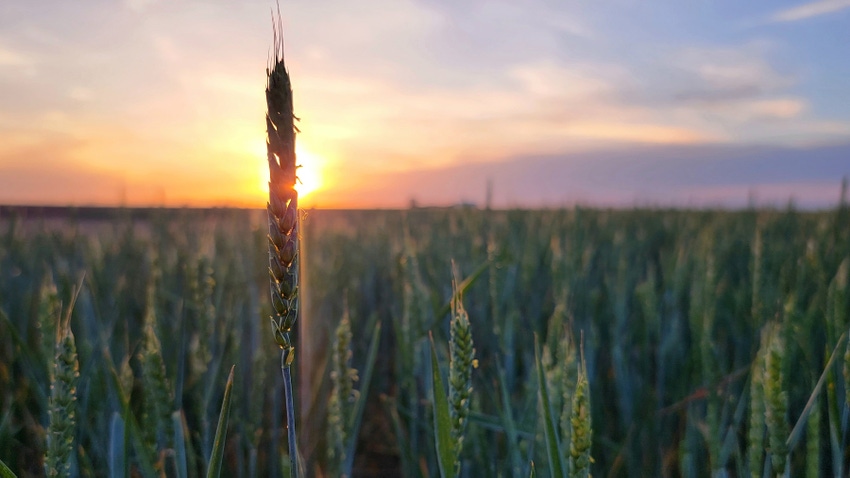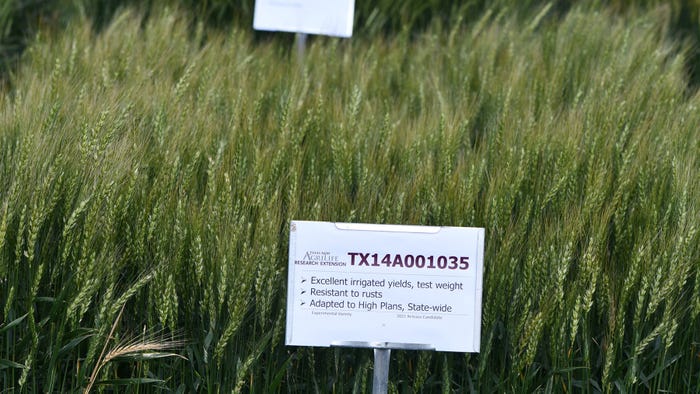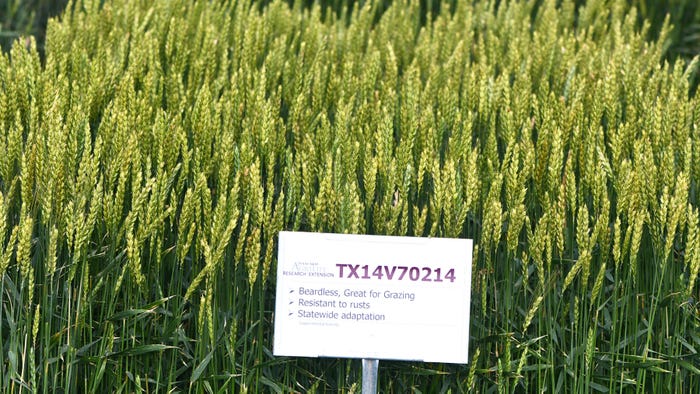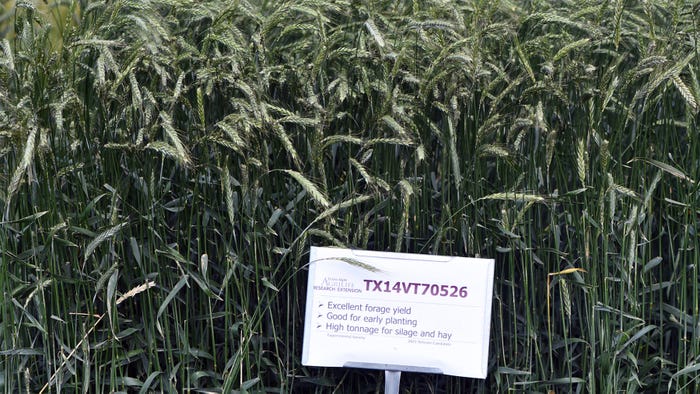
Two new wheat varieties and a new triticale variety are headed to farmers in the fall of 2024, according to an announcement by Texas A&M AgriLife and the Texas A&M Wheat Improvement Program.
Texas A&M AgriLife Research wheat breeders Jackie Rudd, Amarillo, and Amir Ibrahim, Bryan-College Station, both within the Texas A&M College of Agriculture and Life Sciences Department of Soil and Crop Sciences, made the announcement at the recent small grains field day at the research plots near Bushland.

The new wheat variety, ‘TAM 116,’ was grown for many years in test plots before being released for licensing. Licensed now by Adaptive Genetics, seed should be available to farmers in 2024. (Texas A&M AgriLife photo by Kay Ledbetter)
The wheat breeders put their experimental lines through observation trials and 20 elite line breeder trials before planting them in uniform variety trials at 30 locations across the state to test the genetics by environment.
New Texas A&M AgriLife-bred varieties
‘TAM 116’ is licensed to Adaptive Genetics and has been tested through the years as TX14A001035 in field trials.
“This is a dual-purpose wheat with excellent yield potential, good disease resistance and good end-use quality,” Rudd said. “It has performed exceedingly well under intensive management systems.”

The beardless wheat variety TX14V70214 will soon be licensed by JoMar Seeds under the name ‘Dyna-Gro 7322.’ This new wheat variety is expected to be broadly adapted after performing well in grain, forage and silage trials. (Texas A&M AgriLife photo by Kay Ledbetter)
‘Dyna-Gro 7322’ is in the process of being licensed to JoMar Seeds, which will work with Nutrien to commercialize the variety. It was tested over the years as TX14V70214 in the breeding and variety trials.
“This is a broadly adapted beardless, dual-purpose variety with good grain yields, excellent foliage disease resistance and high forage yields,” Rudd said. “It has performed well in grain trials as well as in forage and silage trials.”
‘Titan’ is the new triticale licensed by Watley Seed. This triticale can be planted early for fall growth. It has good winter hardiness and is an early maturing variety.
Jason Baker, research specialist for AgriLife Research, Amarillo, was the breeder of Titan, which is going through the increased seed production stage this year. He said it will probably be next fall when the seed becomes available to farmers.
“We’ve tested this variety over multiple years on locations from eastern New Mexico to western Kansas to Comanche and Abilene – both forage and silage tests,” Baker said. “It does well in diverse testing areas for multiple purposes and ranks near the top on all of them.”

TX14VT70526 is a recently licensed triticale that will be marketed under the name ‘Titan’ by Watley Seed. The variety is the first released by Texas A&M AgriLife in more than 15 years. (Texas A&M AgriLife photo by Kay Ledbetter)
Baker said it has been 15 years since AgriLife Research released a new triticale, but “we can expect others in the coming years because we have good ones in the pipeline that are focusing more on silage purposes.”
Public wheat breeding leads to commercial licensing
Richard Vierling, Ph.D., director of the Texas A&M AgriLife Research and Extension Center at Vernon and Texas A&M AgriLife Foundation Seed director, and Sean Stephens, manager at Foundation Seed, are responsible for producing genetically pure Foundation Class seed of the new cultivars developed by AgriLife Research scientists.
“When breeders have an experimental line they believe is ready, two things happen,” Vierling said. “They contact Sean for seed increase and work with me to develop materials containing descriptive information about the lines available to license. We distribute those descriptions and ask companies with a commercial interest to submit a proposal for licensing.”
Breeders also work with Janie Hurley at Texas A&M Innovation to document the new variety as potential new intellectual property and review background information regarding its development.
Once a proposal is selected, license negotiation is carried out by Texas A&M Innovation, the office that licenses new varieties to companies for commercial purposes. Texas A&M Innovation also works with the companies and breeders to seek the appropriate intellectual property protection, like Plant Variety Protection certification, for the new varieties.
More varieties in the pipeline
Stephens is already expanding the seed availability of two experimental lines that Ibrahim and Rudd believe show promise to initiate commercial production later this year.
TX15M8024 has good yield, milling and bread quality. It is resistant to rusts and the Hessian fly and adapted to the Blacklands and South Texas.
TX16M9216 also has Hessian fly resistance, along with resistance to leaf, stripe and stem rust. It has good yields and test weights and should be adaptable statewide.
Ibrahim said the TX in the name stands for Texas and 15 is the year it was grown in the head row. A variety begins as an F1 in the greenhouse and then F2 in the field. Disease reactions are looked at in F3 and F4 years before the F5 generation when it is grown for a head row.
“There are many diverse climates across Texas – dry and cooler up here in the Panhandle where more than a third of the Texas crop is grown, and hot and humid further south,” Ibrahim said. “There is rarely a line that will do well across the entire state of Texas. Some don’t have the leaf rust we need in the south or the Hessian fly resistance.”
Source: Texas A&M AgriLife Extension, AgriLife Today
Read more about:
Seed VarietiesAbout the Author(s)
You May Also Like




